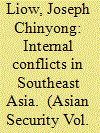| Srl | Item |
| 1 |
ID:
077689


|
|
|
|
|
| Publication |
2007.
|
| Summary/Abstract |
This article looks at the motivations of the Indonesian government and GAM to shift from a purely military strategy in the 1980s and 1990s to a combined strategy in 2000, which for the first time included negotiations. It starts by considering the paradigms through which Jakarta viewed Aceh and GAM viewed Indonesia, and then demonstrates that these paradigms necessitated military action by both protagonists. It then proceeds to explore the changes in the Indonesian governments after the fall of Suharto and their attitudes toward both negotiations and military solution. This is followed by an analysis of GAM's position on negotiations. It will be argued that for both Indonesia and GAM negotiations were part of a broader politico-military strategy rather than an either/or position. It will be further argued that in both cases military weakness, though not a defeat in a conventional sense, played an important role in the decision to embrace the negotiating table.
|
|
|
|
|
|
|
|
|
|
|
|
|
|
|
|
| 2 |
ID:
077688


|
|
|
| 3 |
ID:
077691


|
|
|
|
|
| Publication |
2007.
|
| Summary/Abstract |
The paper attempts to shift the issue of the ethnic minorities in Myanmar to centre-stage. For some time, the discussion of Myanmar politics have been largely focused on Aung San Suu Kyi and the National League of Democracy (NLD), which should not be the case because many of Myanmar's problems are connected to the ethnic minorities and can only be resolved with their cooperation and support, and not just the NLD. Myanmar has also been labeled as a 'weak' or 'failed state' but the regime remains strong. Any approach to transform Myanmar from a weak to a strong state would first require an understanding of the underlying causes of the internal conflicts in Myanmar. By describing and explaining the root and evolution of the conflict between the central government and the minority groups, this paper hopes to contribute to this understanding
|
|
|
|
|
|
|
|
|
|
|
|
|
|
|
|
| 4 |
ID:
077692


|
|
|
|
|
| Publication |
2007.
|
| Summary/Abstract |
This article revisits the issue of the quest for the "Bangsamoro" since its first articulations in the 1960s. It examines the dynamics of identity in the history of this struggle and how these dynamics have shaped the Muslim separatist movements in the Philippines. Given the diverging trajectories of "Moro" groups that took up the "Bangsamoro" struggle and the contemporary developments that have since unfolded over the years, the paper argues that the issue of identity is a tenuous factor undergirding the fight for a "Bangsamoro" homeland. It is tenuous for many reasons: one of these is the construction of a "Moro" identity, which has come to mean different things to the many multi-ethnic and multi-lingual groups. The other is divisive history of the various ethnic groups who have wanted to be part of the envisioned separate state called the "Bangsamoro
|
|
|
|
|
|
|
|
|
|
|
|
|
|
|
|
| 5 |
ID:
077690


|
|
|
|
|
| Publication |
2007.
|
| Summary/Abstract |
In Thailand, efforts to identify the dynamics, causes, and culprits of the ongoing violence in the Muslim-majority provinces of the south have been informed by narratives of conspiracy. The surge of violence that has wracked the border provinces since early 2004 is suspected by many to be driven not only by ideologically motivated "militants," but by pragmatic interest groups. Suspicions of secret manipulation are deeply embedded in Thailand, reflecting the ways that power is disguised and deployed in state and non-state realms. Low thresholds of trust inform an existing culture of rumor which is easily exploitable by competing groups, including militants. Thailand's borderland Muslim-majority provinces have long been the site of overlapping networks of predatory officials, criminal interests, and political groups, where ethno-religious difference and a problematic history add a potent ingredient for volatility and manipulation. This paper explores the interlinked themes of conspiracy-disorder by examining a number of intelligence documents and commentaries over the period 2004 to 2006. Prevailing suspicions of conspiracy expose the critical role of Thailand's "disorderly state-society complex" in perpetuating instability in the southern borderland. The intimate connection between crime and militant groups in the current violence is highlighted
|
|
|
|
|
|
|
|
|
|
|
|
|
|
|
|